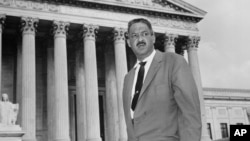Thurgood Marshall was confirmed as the first African-American member of the U.S. Supreme Court 50 years ago this August.
As Black History Month came to a close last month, District of Columbia Congresswoman Eleanor Holmes Norton said she believed no one had been better-prepared to be a Supreme Court justice than Marshall.
“Certainly none has ever argued a case like Brown v. Board of Education - a decision that changed the country.” In the 1954 ruling, the high court said segregated public schools were unconstitutional. Marshall had argued the case before the court.
Norton led a recent discussion at Howard University School of Law, from which Marshall graduated magna cum laude.
"With the current Supreme Court vacancy currently under debate, there is no better time to take a step back and examine the 50-year journey of civil and voting rights,” she said.
Some participants in the event, who were representative of the U.S. capital’s African-American majority, argued that key tenets of Marshall’s legacy have been placed under assault in the early days of the Trump administration.
Racially-integrated schools
Danielle Holley-Walker, dean of the Howard law school, said Marshall would want people today to remember why racially-integrated schools are so important.
“If we don’t have racially integrated schools, we have schools with concentrated poverty, and those schools with concentrated poverty get less resources and have less abilities to bring in teachers who have the ability to really sustain and open up our classrooms," Holley-Walker said.
There is a need to “reaffirm that we value high-quality public schools for all students, regardless of their racial and socio-economic backgrounds,” she said, adding that was “one of the major causes of Thurgood Marshall’s life and something we need to desperately reclaim.”
The country has made progress in racial integration of public schools, but in many other areas, such as criminal justice reform, "we see ourselves in many ways going backwards," Holley-Walker said.
Todd Cox, director of policy at the NAACP Legal Defense and Education Fund, questioned the commitment of the Trump administration to public schools.
"We now have a secretary of education whose commitment to education equality and education equity is questionable, not to mention her knowledge of many of the principles of federalism we rely on," Cox said. "The fact that the federal government does have, quite frankly, a role in our educational system was unclear during her confirmation hearing.”
At that hearing and for years before, recently confirmed Secretary of Education Betsy DeVos argued for more alternatives to traditional schools, advocating public funding to private schools. However she insisted at her confirmation hearing that she would be a strong advocate of great public schools as well.
“Parents no longer believe that a one-size-fits-all model of learning meets the needs of every child … yet too many parents are denied access to the full range of options,” she said.
That failed to satisfy defenders of traditional schools, who fear that if government resources are diverted to private schools, those children left behind in public schools will suffer.
“We fought very hard to make transformative change in this country, to ensure dignity, racial justice, and now we are in a situation where we are really facing a threat to our democracy from within,” Cox said.
Trump travel ban
He said the civil rights group he represents also worries that the rights of some African-Americans are threatened by the President Donald Trump’s attitude toward Muslims, as exemplified by his executive order blocking travel to the United States from seven Muslim-majority nations.
Homeland Security chief John Kelly said when the ban was introduced that it was not aimed specifically at Muslims, but rather at honoring his agency’s mission “to safeguard the American people, our homeland, our values."
However the order was blocked by U.S. courts, which questioned Trump’s argument that the ban was needed to protect against terrorism. The administration has promised to issue a new order shortly.
Cox pointed out that about 28 percent of American-born Muslims are of African-American heritage and said the NAACP will “stand with that community.”
He said people must make sure “we are fighting hard for the rule of law and to make real and true of what the legacy of Justice Marshall has been and should continue to be: a nation founded on the rule of law, a nation that appreciates and cherishes the diversity that is representative of all its citizens, and [to] make sure that the government is held to account.”
Criminal justice reform, police brutality
Angela Rye, CEO of IMPACT Strategies and former executive director of the Congressional Black Caucus, said, “When I think about honoring Marshall, I think we have to acknowledge where we are, and where we are is in a very tragic space.”
Among the challenges facing African-Americans, she listed voting rights challenges, discriminatory housing policies and justice-reform initiatives that fail to ensure equal treatment for all Americans.
The event came days after the anniversary of the death of Trayvon Martin, a black youth whose death at the hands of a neighborhood watch volunteer sparked the “Black Lives Matter” movement. Rye reminded the audience of the continuing debate over the treatment of African-Americans by police, which prompted the former administration of President Barack Obama to implement close federal supervision of several city police departments.
The Trump administration has indicated it will roll back those programs, positioning itself as a firm defender and supporter of the forces of law and order.
“When we think about the many things that President Obama did, even if some argue that it wasn’t enough to address criminal justice reform or police brutality and excessive violence related concerns, we realize we have so far to go," Rye said.







